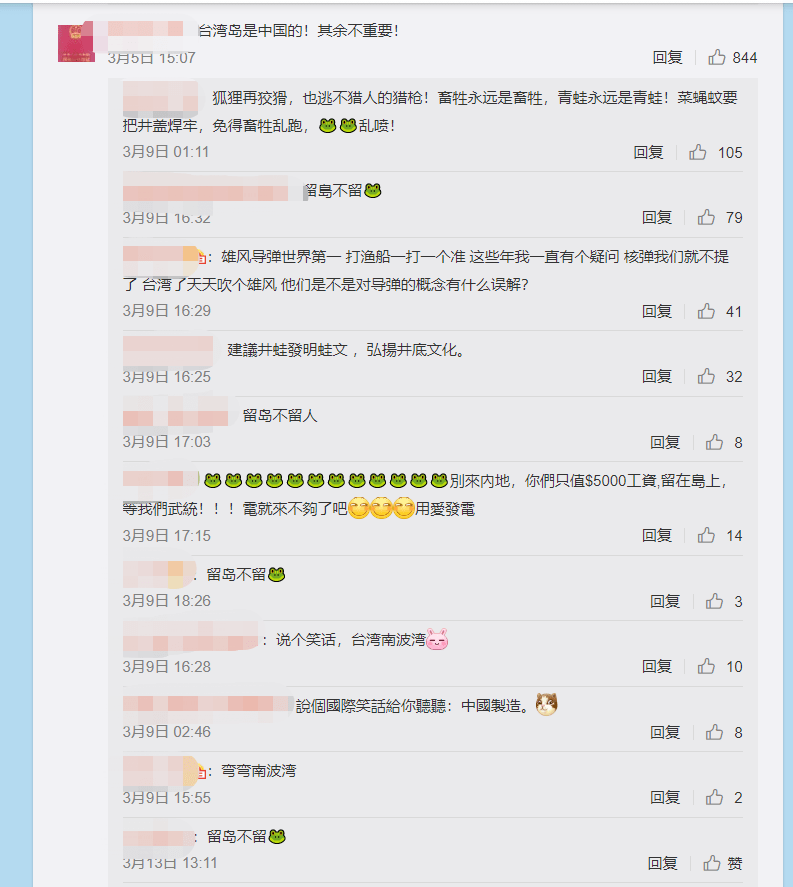Why is it difficult for young people on both sides to understand each other?


A while ago, the People's Daily criticized the Taiwanese media for still using the discriminatory term "Wuhan pneumonia". Young people on both sides of the strait said they produced a program in which mainlanders criticized Taiwan; Taiwanese internet celebrities "Zhong Mingxuan" and "curator" fought back, and netizens on both sides of the strait scolded each other again. I put the abuse of mainlanders against Taiwan on Weibo below.


When it comes to Taiwan politics on Weibo, there are generally no good words. . . Basically, it is to satirize Taiwan as a frog in the well and a military system. . . Of course, there are also all kinds of extreme hatred of China on PTT, so I won't bring it up.
In short, this article wants to briefly discuss a question: why can't netizens on both sides of the strait understand each other?
As you can see from the second picture, Taiwanese netizens replied to me: Beijing must stop suppressing Taiwan first, and don’t raise little pinks. . . This embodies the typical thoughts of two Taiwanese netizens:
1. "Beijing has been suppressing Taiwan." In fact, this is the result of Taiwan's propaganda to the people of Taiwan regardless of whether it is blue or green. From a mainlander's point of view, this is not a suppression. Because of the one-China principle, before this major political difference is resolved, the international wrestling between the two sides has existed for a long time and is zero-sum. Because there is only one China, if you admit it, you cannot admit me. You protect your interests, but at the same time, my interests must be damaged. So, of course, both sides must safeguard their own interests and fight for it. For example, before 1971, when Taiwan was in the United Nations, it also tried every means to prevent the mainland from entering the United Nations. It's just that the feng shui turns, and the strength of the two sides of the strait fluctuates. To this day, every international wrestling between the two sides is basically a failure of Taiwan. This creates a feeling of "suppression", that is, the mainland has been bullying Taiwan. In fact, if the strengths of the two sides of the strait are similar, and the struggle between you and me is relatively balanced, there will be no sense of "suppression". And as I just said, this kind of struggle is zero-sum, I am not trying to bully you, but I want to protect my own interests. . . Can I still sacrifice myself for you? So you can only die as a fellow Daoist and not as a poor Daoist. . . The mainland believes in the principle of strength. Therefore, in the thinking of the mainland, we each use our abilities to protect our own interests. . . How can this be called suppression? I'm just defending my own interests. You can also safeguard your interests, but your strength is too small to safeguard them. Such a process erases the positional expression of "suppression". Fair competition, willing to gamble to admit defeat.
Therefore, from this first point, it can be seen that the two sides of the Taiwan Strait have different positions and different situations, and it is difficult to understand each other.
2. "Raising Little Pink". The beauty of this is the word "nurture". This basically reflects another very typical Taiwanese thinking. That is to say: those who stand on the mainland's stand and defend the interests of the mainland and scold Taiwan are the Internet army raised by Beijing. Similar to the word fifty cents. Of course, part of this is due to scolding, but for a considerable number of Taiwanese, it also reflects the following mentality: they do not believe that mainlanders will voluntarily support the Beijing government, and will spontaneously defend and defend the claims of the Beijing government. .
If there are, they are also brainwashed by Beijing and cannot distinguish right from wrong. . . Because in their opinion, Beijing is such a bad government, how can anyone support such a government? How can mainlanders not yearn for Taiwan's democracy and freedom and thus speak for Taiwanese? Therefore, they think that they are the Internet army of the mainland government, that they are small pinks raised by fifty cents, and that they are paid by the government.
Their reasons are as follows: after the founding of the People's Republic of China, Beijing has had so many movements, causing such a catastrophe, and since the reform and opening up, there has been a turmoil at the turn of the spring and summer, and now it still refuses to go to Western politics, builds a network firewall, and has strict governance methods in Xinjiang. There are also often acts of "disrespect for human rights" against the people of the mainland. So they really can't believe why mainlanders still support Beijing. They can only comfort themselves: they have been brainwashed and poisoned, and they don't look for the truth after overcoming the wall; or they are simply sent by the government.
Such thinking is obviously narrow-minded. I'm trying to explain it here:
The various things before the reform and opening up, the young people in mainland China have never experienced it, but generally believe that the reform and opening up has come, and the me of yesterday is not the me of today; Following in the footsteps of the Soviet Union, China has risen today. As for the various problems that still exist today, it can be said that although there is some dissatisfaction, every country has problems. The United States still has a lot of guns and serious racism. Why has it hindered Americans from being patriotic? Anti-Taiwan independence is the meaning of the Chinese people's question. How can they change their position because of the shortcomings of the mainland? When bathing a child, the dirty bath water must be thrown away. It seems that it will take time to drain it, but it must not be thrown away with the child. What's more, the various problems in the mainland reported in the Taiwan news are not encountered in ordinary life in the mainland. It's like America seems to have a lot of shootings, but you actually live there and you rarely encounter them. Because China and the United States are so big, the real life situation in many news stories is far away. Therefore, the actual situation is: the vast majority of people who go online, go over the wall and debate with Taiwanese are mainlanders who have a decent life and have not encountered all kinds of injustices. (Or in other words, the unfair treatment of the mainland is also encountered by a few people, and some inconveniences in the mainland can be easily overcome, such as overcoming the wall.) In the imagination of Taiwanese, living in the mainland may be in dire straits, trembling in fear at any time. Be careful, it will disappear if you cross a little. In fact, this is far from reality. The real situation is that the vast majority of mainlanders live and work in peace and contentment and can live a decent life. Of course, a few people, young and old, in marginal and poor areas, and in extremely poor rural areas, have no time to go online or even go over the wall to communicate with Taiwanese netizens.
At the same time, just like the above story about the bath water and the child, the bath water must be thrown out of course if it is dirty, but the child has to keep it anyway. To further illustrate, here are a few examples: Although India adopts the Western political system, there are still many domestic problems, but the Indian democrats still support Modi to drive the army into Kashmir, and even cut off the Internet in Kashmir, arresting and killing people in protest. of Kashmiris. Can Taiwanese understand: India has so many internal problems that have not been resolved, why does it have to support the government and trouble the Kashmiris?
There is also the Philippines. Although it also adopts the Western political system, its industrialization is far from complete. There are not many job opportunities in the country. However, in the face of the South China Sea issue, the Philippines still has high nationalism and wants to confront the mainland. There are so many problems in the Philippine country, why is it that the Filipinos are patriotic and support the government? Why don't they solve the internal problems of the Philippines first, and then compete with the mainland on a few broken stones in the South China Sea?
Taiwanese netizens believe that in Taiwan, a society with free speech, they can not be brainwashed, read articles from six sources, listen to opinions from all directions, think independently, and make rational judgments. Therefore, I am writing this article to make efforts to enhance mutual understanding and chat between the two sides of the Taiwan Strait.
Like my work? Don't forget to support and clap, let me know that you are with me on the road of creation. Keep this enthusiasm together!

- Author
- More